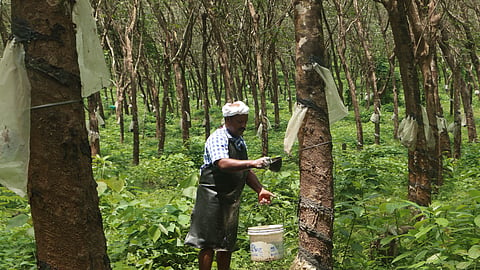

KOTTAYAM: The price of natural rubber in the domestic market, which surpassed Rs. 200 per kg for the first time in 12 years in June this year, has marked the all-time record on Thursday. According to the daily price report from the Rubber Board, the price for ribbed smoked rubber (RSS) - 4 grade (sheet rubber) hit Rs. 244 per kg in Kottayam market.
This new record surpasses the previous highest price of Rs. 243 per kg, which was set on April 5, 2011 for RSS-4 sheet rubber. All other lower grades correspondingly fetched good prices according to the daily price chart released by the Rubber Board. The price of rubber latex now stands at Rs. 240 per kg, while crepe rubber is priced at Rs. 165 per kg.
With the price levels in the international market centres also shooting up to unprecedented levels, the boom trend is swaying the domestic market and is bound to stay in the coming weeks. This trend is expected to continue in the coming weeks, with predictions that the price will soon exceed Rs. 250 per kg as tyre companies are already started purchasing rubber from traders at Rs. 250 to Rs. 255 per kg, according to market sources.
The market analysts predict that the current boom in rubber prices is likely to have a lasting impact on the market. “The dip in production in other rubber-producing countries, coupled with a shortage of stock among tyre companies, has bolstered the domestic market. Additionally, adverse weather conditions have led to a shortage in the domestic market. Therefore, we anticipate that this trend will persist for the foreseeable future,” said Biju P Thomas, secretary, Indian Rubber Dealers Federation.
Meanwhile, rubber farmers and dealers are closely monitoring market developments, anticipating the involvement of major tyre companies to regulate the market. According to a dealer, JK Tyres and CEAT have depleted their stocks and have already purchased sheet rubber at prices ranging from Rs. 250 to Rs. 255 from domestic market. “On the other hand, companies like MRF and Apollo refrained from purchasing rubber from dealers when prices exceeded Rs. 232 per kilogram.
Delays in importing rubber have impacted the domestic market, potentially leading other companies to turn to domestic sources for their rubber needs. This could result in further price increases in the domestic market,” explained a dealer in Kottayam.
While heavy rainfall in North Kerala has affected rubber production there, the climate in South Kerala remains favorable for production. Dealers have noted that farmers in Central Travancore have begun bringing undried sheet rubber to the market in view of higher prices. Farmers are also hopeful of benefiting from the price increase in the coming days. “If the current climate conditions persist for the next two weeks, farmers may be able to increase production in the coming days. We hope that the trend in prices will continue even if rubber flow into the market rises,” said Babu Joseph, the general secretary of the National Consortium of Rubber Producers' Societies (NCRPS).